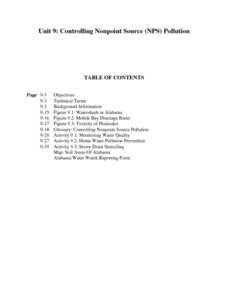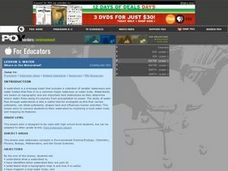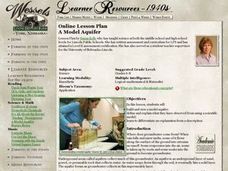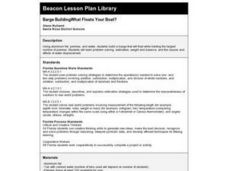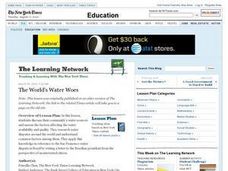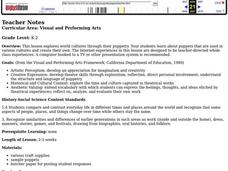Curated OER
Controlling Nonpoint Source Pollution
Students examine factors affecting water quality. They test water in a local body of water to determine its quality. They collect data and continue monitoring the water monthly. They assess water quality in the home and on the farm.
Curated OER
Water Pollution Prevention and Conservation
Students examine how to conserve water. They also discover how to prevent water pollution. They examine the Earth's water distribution as well.
Curated OER
Winter
High schoolers explore the nature of water and water molecules. They examine the role of ice on organisms.
Curated OER
River to the Sea
Students investigate the function of wathersheds and weather while they follow Lewis and Clark on their jouney west. They also create a map using acurate measurements and build a model watershed.
Curated OER
Sunflower Sundance
First graders study sunflower plants and identify its parts. They plant sunflower seeds and watch them grow and make sunflowers out of paper plates and colored paper. They watch videos and visit websites about sunflowers.
Curated OER
Water: Where in the Watershed?
Students become connected to their watershed by exploring a local water body and mapping its features. They focus on how the local watershed fits into the larger scheme of the watershed.
Curated OER
Water: Water Use Picture Project
High schoolers document how water is used in their local communities and explore how those uses impact the local environment. They utilize digital photography to document water use.
Curated OER
1st Grade - Act. 19: Will it Float?
First graders drop items into water, and discuss why some things float and others sink.
Curated OER
A Model Aquifer
Students build a model that depicts how water is stored in an aquifer. They examine ways in which groundwater can become contaminated.
Curated OER
Taking Account of Water
Students discover how much water they actually use and investigate the need for water conservation.
Curated OER
Shedding Light on Watersheds
Students discuss what a watershed is, complete online activities showing them how to take care of a watershed, and create a model of a watershed that they experiment with to see what happens when it is disrupted by civilization.
Curated OER
Barge Building: What Floats Your Boat?
Learners construct aluminum foil boats that float while holding the greatest number of pennies. They investigate the concept of water displacement, record their results, and watch a Bill Nye video on buoyancy.
Curated OER
DIGITAL WATERWORKS
Learners add digitally-produced, water sound effects to a song, using electronic keyboards.
Curated OER
Freeze Pops
Students experience problem-based learning as they use prior knowledge of the states of matter to keep a frozen juice bar from melting.
Curated OER
The Weight of Water
Young scholars examine how salt water is more dense than fresh water through experimentation with eggs.
Curated OER
Our Watershed
Students work with the Tribal Council and Elders to explain the historical importance of the area's watershed. They develop a model of the watershed and map the route of water flow from the watershed to the ocean.
Curated OER
The World's Water Woes
Students discuss their community's water sources and assess the factors affecting the water availability and quality. They research water disputes around the world and explain common factors among them.
Curated OER
PUPPETRY
Students explore world cultures through their puppetry. Your students explore puppets that are used in various cultures and create their own. The Internet experiences in this instructional activity are designed to be teacher-directed...
Curated OER
CLIMATE AND WEATHER UNIT
Students locate on-line weather source, gathers and interprets weather data, work collaboratively on-line with other schools to collect weather data, and write about the cause of temperature inconsistencies in various locations.
Curated OER
GROWING PLANTS UNIT
Learners predict outcomes of scientific experiment,.conduct a scientific experiment with control groups, and plant seeds to observe, measure, and compare growth across groups. They gather, record, analyze, and share data with other...
US Environmental Protection Agency
Water, Now and Then
Students describe, orally or in writing, ways people have depended on water during different periods of history. This nearly 500 page document is rich with diverse lessons and activities that will transform your young learners into water...
Peace Corps
Weather and Water in Ghana
Young scholars investigate the climate of their region. Students research statistics and conduct interviews. Young scholars take a virtual tour of Ghana and discuss its climate. Students consider water conservation and the role it plays...
Curated OER
Water: The Flow of Women's Work
Middle schoolers view photographs, read, and reflect on their own environments to gather information about gender roles in Lesotho and the United States. Students role-play gender role related scenarios and write about their reflections...
Curated OER
Narrative vs. Expository Texts
Young scholars use examples of narrative and expository text to analyze and compare the two styles. Students read articles on life in Lesotho and Madagascar and use graphic organizers and discussion to compare them. Young scholars write...


